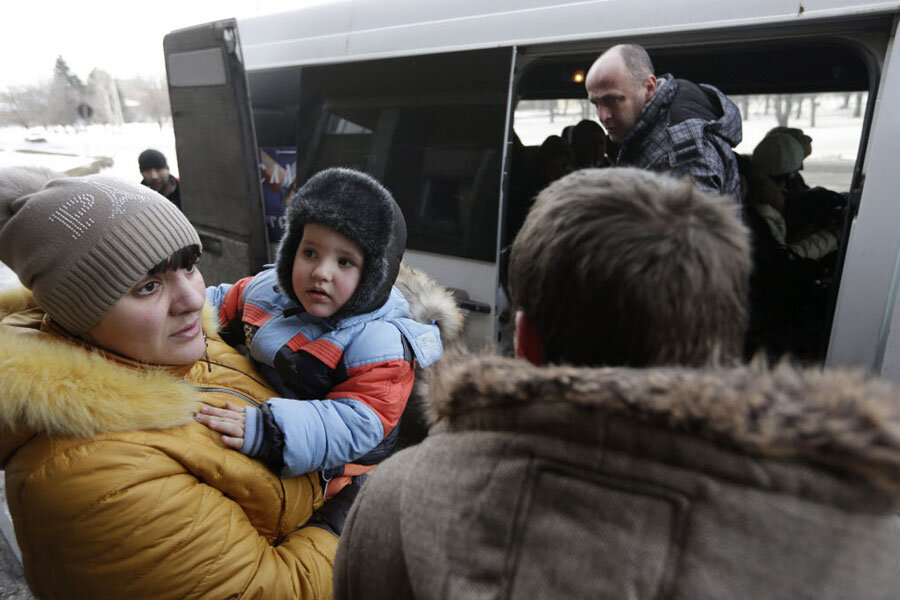Government supporters in Ukraine flee town as rebels advance
Loading...
Outgoing heavy-caliber fire boomed incessantly, shaking the ground and rattling windows around the besieged town. Residents of Debaltseve, seemingly inured to the racket, listened impassively as they mustered at the town hall on Saturday to be evacuated with as many belongings as they could carry.
The government-held town has been without power, water and gas for at least 10 days, prompting many to flee from an intense artillery duel between government and Russian-backed separatist forces. Almost every one of the largely deserted streets in the center showed signs of having been struck by projectiles.
A month of relative quiet in eastern Ukraine was shattered in early January by full-blown fighting as the separatists attempted to claw back additional territory from government hands. Rebel leaders accused Ukraine of mobilizing its forces in advance of an imminent offensive.
Ukrainian Prime Minister Arseniy Yatsenyuk said on Saturday that 1,000 residents have been evacuated in the past days from Debaltseve. But the number of crammed civilian vehicles seen speeding out of the town's rutted, icy roads over the past few days suggests official figures may be on the conservative side.
"Six buses shuttle (refugees) from there and they constantly come under fire," Yatsenyuk said in comments carried by his press office. "As soon as they (the rebels) see that we are evacuating the people, they open fire."
Yatsenyuk has asked the defense ministry to help secure the evacuation and added that none of the refugees has been injured.
Vyacheslav Abroskin, head of police for the Donetsk region, said 12 people had been killed by shelling in Debaltseve, which hosts a strategic railway hub. He did not specify over what period the deaths had taken place.
With the government apparently unable to handle all the people wishing to leave, volunteer groups are trying to fill the gap.
"We are evacuating people from this hotspot, so they don't have to deal with what is going on, because this is not their war after all. This has nothing to do with them," said Andrei Vasilyev, a worker with a charitable organization based in the eastern city of Kharkiv.
As Vasilyev's minibus was being loaded, a small child held in his mother's arms pleaded plaintively to leave as soon as possible. Infirm and elderly passengers needed to be lifted into the tightly packed transport.
Leaving Debaltseve carries its own risks because of the encroachment of separatist forces on all sides. Roads running west and east are controlled by rebels, leaving the northbound road the only remaining corridor of relative safety. But fresh, scorched shell craters alongside that road testify that it is dangerous too.
Fighting inched toward Debaltseve this week when separatists burst through government lines to occupy part of the town of Vuhlehirsk.
The towns are separated by 13 kilometers (eight miles) of road and railroad. When Ukrainian troops were overrun by formidably armed rebel attackers Thursday, some soldiers were forced to retreat to their positions in Debaltseve on foot.
Despite claiming to rely solely on military equipment poached from the Ukrainian army, separatist forces have consistently deployed vast quantities of powerful weapons, some of which military experts say is not even known to be in Ukraine's possession.
Since the conflict started in April, it has claimed more than 5,100 lives and displaced more than 900,000 people across the country, according to U.N. estimates.
Ukraine's Defense Minister Stepan Poltorak said on Saturday that 15 soldiers had died and that another 30 were injured over the previous day's fighting.
"This happened along the entire line of conflict, starting from the Luhansk region and ending in Mariupol," he said.
The United Nations on Friday voiced concern about the deteriorating situation in Debaltseve and other densely populated areas where intense fighting is going on. Neal Walker, the U.N. Humanitarian Coordinator in Ukraine, has called for an immediate humanitarian truce to allow humanitarian assistance and evacuation of civilians.
Efforts to hold talks on halting the escalating violence have to date been unsuccessful.
Rebel representatives arrived in Minsk, Belarus, on Friday but left shortly thereafter because of what they said was the failure of Kiev's negotiators to turn up. Ukrainian Foreign Ministry spokesman Yevhen Perebiynis reiterated his government's consistent line, which is that Ukraine will send its envoy to talks only if the rebel leaders are there.
By early Saturday afternoon, representatives for the rebels, Russia, Ukraine and the Organization for Security and Cooperation in Europe had all met in Minsk for talks, but no details were immediately available.
Later, Russian President Putin, French President Francois Hollande and German Chancellor Angela Merkel had a telephone conversation and all expressed hope that the negotiations will focus on a cease-fire and pulling out heavy weaponry from residential areas, the Kremlin said.





